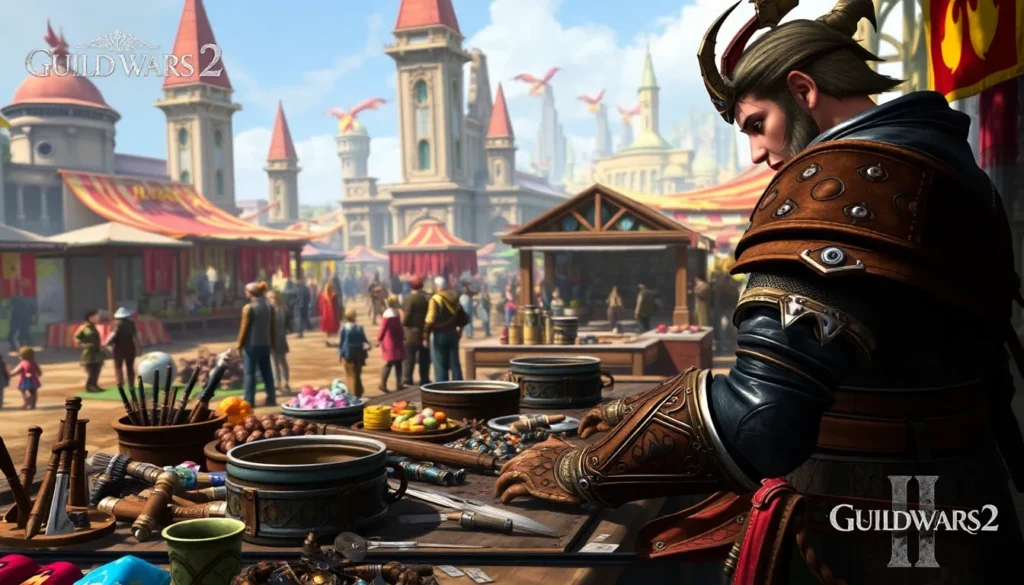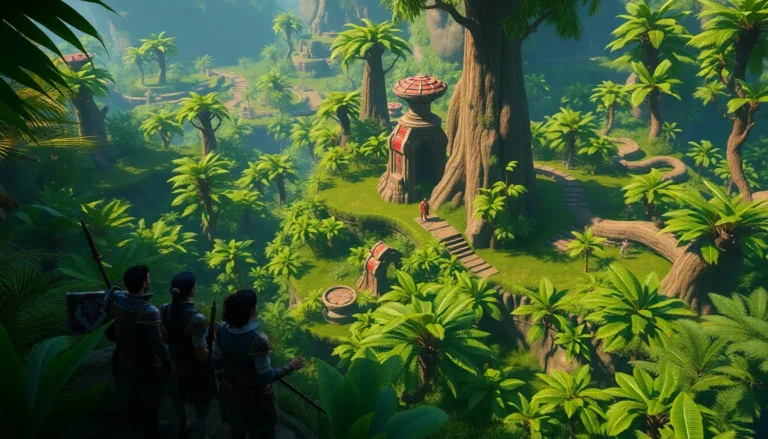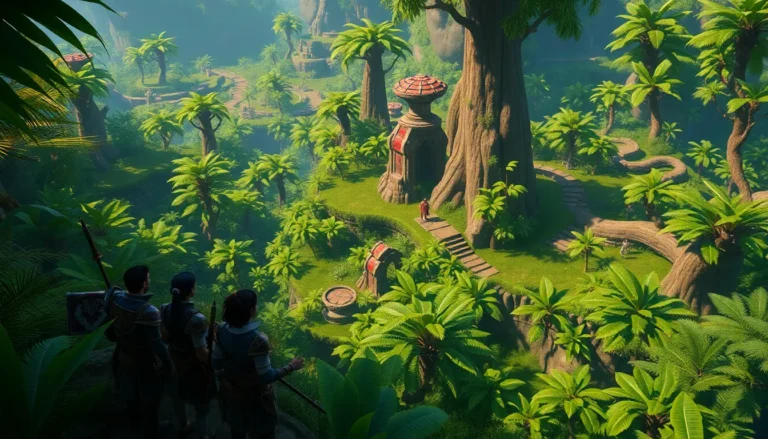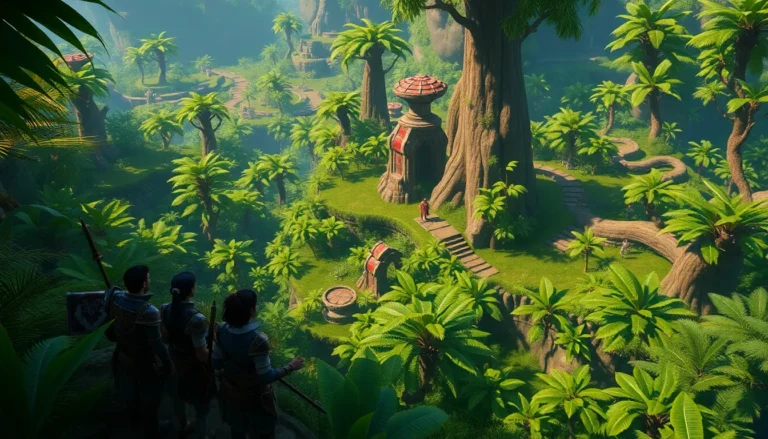Table of Contents
ToggleIn the vibrant world of Guild Wars 2, crafting isn’t just a means to an end; it’s an art form that can turn a humble player into a legendary creator. Imagine wielding the power to forge your own weapons and armor while channeling your inner artisan. Whether it’s whipping up a batch of potions or stitching together a stylish new outfit, crafting offers endless possibilities and a chance to flex those creative muscles.
Overview of Guild Wars 2 Crafting
Crafting in Guild Wars 2 serves as a pivotal aspect of gameplay, allowing players to create a wide range of items, from weapons and armor to potions and outfits. Players can choose among several crafting disciplines, including Armorsmith, Weaponsmith, Tailoring, and Cooking, each offering unique specialties and recipes.
Crafting begins with gathering materials through resource collection. Players collect materials such as ores, wood, and cloth from the world, enhancing their crafting capabilities. Every crafting discipline requires specific materials, driving players to explore diverse environments and engage in activities like harvesting and foraging.
Crafting progression relies on earning experience points. Players gain experience by crafting items, unlocking more complex recipes and higher-quality materials as they advance. The mastery of each discipline enables players to cater to their needs and preferences, enhancing their gaming experience significantly.
Players can also discover recipes in various ways, such as by purchasing them from vendors, finding them as loot, or learning them through exploration. Experimentation plays a crucial role in crafting, as players can combine materials to create numerous items, often with unique attributes.
Economically, crafting impacts the game’s market. Crafted items can be sold on the Trading Post, enabling players to earn in-game currency. This interaction between crafting and trading fosters a dynamic player-driven economy, where rare and valuable items can fetch higher prices.
Overall, crafting not only enriches the gameplay experience but also emphasizes community interaction, resource management, and creativity, solidifying its importance in Guild Wars 2.
Crafting Professions
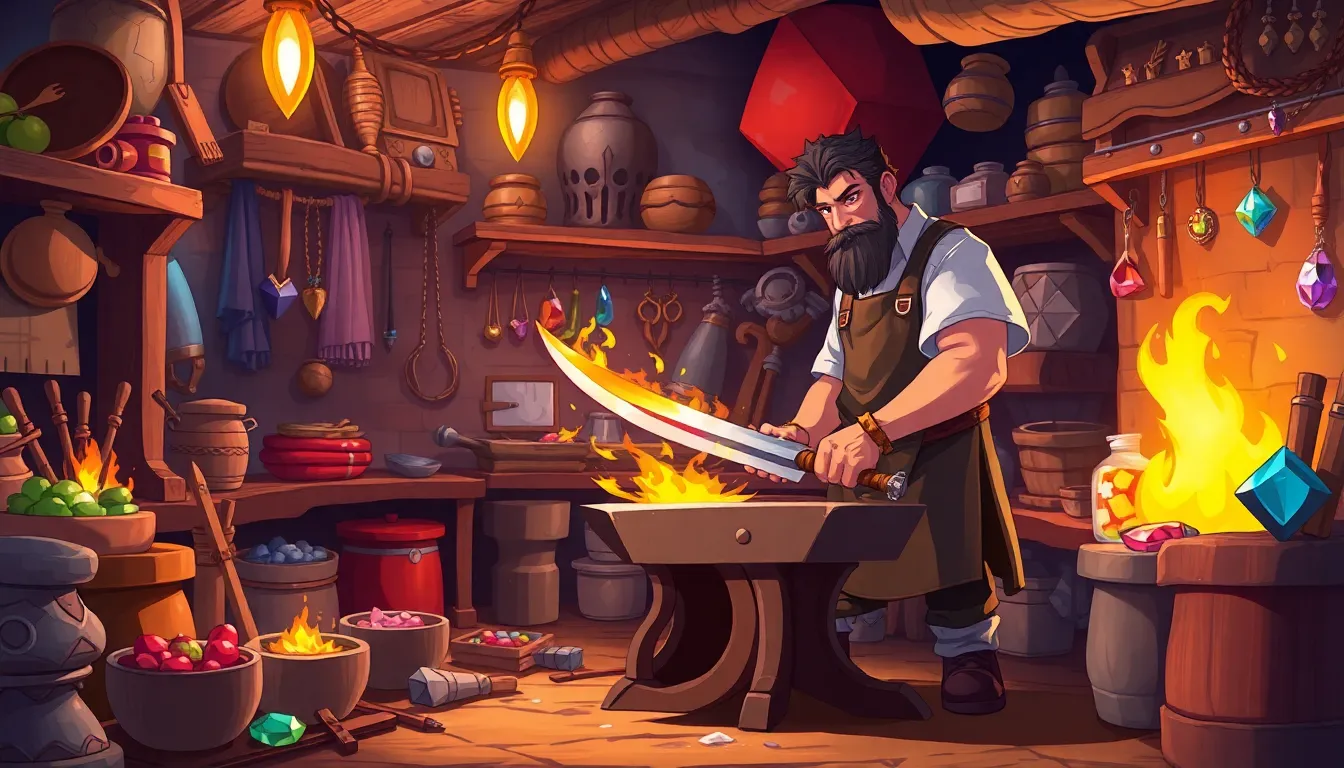
Crafting professions in Guild Wars 2 enable players to create diverse items, enhancing gameplay experiences while showcasing creativity. Each profession comes with its unique specialties and recipes.
Armorsmith
Armorsmithing focuses on creating heavy armor for classes like Guardians and Warriors. This profession uses materials like iron and leather to craft various armor pieces, including chest plates and gauntlets. Players earn experience points by crafting higher-tier items, unlocking advanced recipes and materials. Specialization within Armorsmith can lead to unique attributes on crafted armor, catering to specific gameplay styles.
Weaponsmith
Weaponsmiths create melee weapons like swords, axes, and hammers. By using resources such as steel and wood, players forge a range of weaponry tailored to different combat situations. Players gain experience through crafting, allowing them to unlock complex recipes and more powerful weapons. Unique crafting options provide players the opportunity to add distinctive attributes, enhancing their weapon’s effectiveness in battle.
Tailor
Tailors specialize in crafting light armor, suitable for classes like Mesmers and Thieves. Utilizing materials such as silk andcotton, tailors create garments, including coats and trousers. Progressing through this profession unlocks intricate designs and higher-quality armor pieces. Tailors can also add custom attributes, allowing for personalized playstyles and increasing versatility in combat.
Chef
Culinary experts, or chefs, focus on creating consumable items that restore health or provide buffs. Chefs gather ingredients from various sources, including plants and animal resources, to produce food items. Crafting diverse recipes enables players to enhance their attributes temporarily, improving effectiveness in both PvE and PvP scenarios. Chefs significantly enrich gameplay by providing essential sustenance for adventurers.
Jeweler
Jewelers create rings, earrings, and amulets, enhancing players’ stats. This profession utilizes materials like gemstones and metal to produce items with specific bonuses. Gaining experience through crafting complex jewelry unlocks unique recipes and higher-quality upgrades. Jewelers play a critical role in the economy, as crafted accessories can be sold on the Trading Post, providing valuable resources for other players.
Crafting Materials
Crafting materials in Guild Wars 2 encompass various resources essential for creating items. Players gather these materials through different methods, enhancing their crafting experience.
Gathering Resources
Gathering resources involves collecting materials like wood, ore, and plant fibers from the environment. Players find these resources in specific zones, marked by gathering nodes. Each profession requires distinct materials to craft items. For example, Tailors require plant fibers, while Armorsmiths use metal ores. Resource collection encourages exploration, rewarding players with crafting components essential for progression.
Salvaging Items
Salvaging items provides players with additional crafting materials. Players can dismantle unwanted gear and equipment, extracting components like bolts and shards. Each item has a salvage value, which varies based on its rarity and quality. Players may use a Salvage Kit, found or purchased, to ensure successful dismantling. Salvaging not only recycles gear but also aids players in stockpiling essential crafting materials.
Buying and Selling
Buying and selling crafting materials on the Trading Post fosters a dynamic in-game economy. Players can purchase necessary resources to expedite their crafting efforts or sell surplus materials to gain currency. Pricing fluctuates based on demand and supply, allowing savvy players to capitalize on market trends. Transactions enhance crafting capabilities and promote player interaction, enriching the overall gameplay experience in Guild Wars 2.
Crafting Mechanics
Crafting in Guild Wars 2 involves various mechanics that enhance gameplay and contribute to item creation. Players engage with recipe unlocking and crafting station locations to maximize their crafting efficiency.
Recipe Unlocking
Recipes unlock through specific actions, such as leveling up within a crafting profession or discovering new items. Players earn experience points by crafting, which aids in unlocking more complex recipes. Additionally, players can find recipes from vendors, treasure chests, or through exploration. Experimentation also allows players to combine known materials into new recipes, creating unique items with specialized attributes. Regularly checking crafting professionals for new recipes fosters continual growth in crafting skills.
Crafting Station Locations
Crafting stations are scattered across Tyria, located in major cities and certain outposts. Each crafting profession requires access to its designated station, which players find in places like Divinity’s Reach, Lion’s Arch, or Fort Mariner. Players can also self-provision their own crafting stations at home if they’ve obtained the necessary materials. Using a crafting station allows players to combine gathered resources into crafted items or upgrades, streamlining the crafting process and enhancing convenience.
Benefits of Crafting
Crafting in Guild Wars 2 offers numerous advantages that enhance gameplay and player experience. From gear customization to monetization opportunities, crafting stands as a vital component in the game.
Gear Customization
Crafting enables players to tailor their gear to individual preferences. Each profession offers unique recipes, empowering players to create customized armor and weapons that suit their playstyle. Players can choose specific stats, attributes, or aesthetic designs, enhancing their character’s performance in various situations. Crafted gear can match the player’s desired look and function, resulting in a personalized gameplay experience. Additionally, through experimentation, players might discover rare combinations that yield unique, powerful items, significantly impacting combat effectiveness.
Monetization Strategies
Crafting serves as a lucrative avenue for players seeking to make in-game currency. Players can sell crafted items on the Trading Post, enabling them to profit from their crafting endeavors. High-demand items, such as consumables or gear with sought-after stats, can fetch substantial prices, contributing to player wealth. Crafting also allows players to obtain materials through salvaging and resource collection, minimizing costs and maximizing profit margins. Strategic crafting decisions, such as focusing on trending items or popular recipes, can further enhance income potential, positioning crafting as an essential economic aspect of Guild Wars 2.
Crafting in Guild Wars 2 isn’t just a feature; it’s a vital part of the game’s identity. It empowers players to express their creativity while enhancing their gameplay experience. With various professions to choose from and countless recipes to discover, players can immerse themselves in a world of endless possibilities.
The economic impact of crafting also cannot be overlooked. By participating in the Trading Post, players can monetize their creations, contributing to a vibrant in-game economy. Ultimately, crafting fosters community interaction and resource management, making it an essential element for any player looking to thrive in Tyria. Embracing crafting opens doors to customization and financial opportunities, enriching the adventure in Guild Wars 2.

